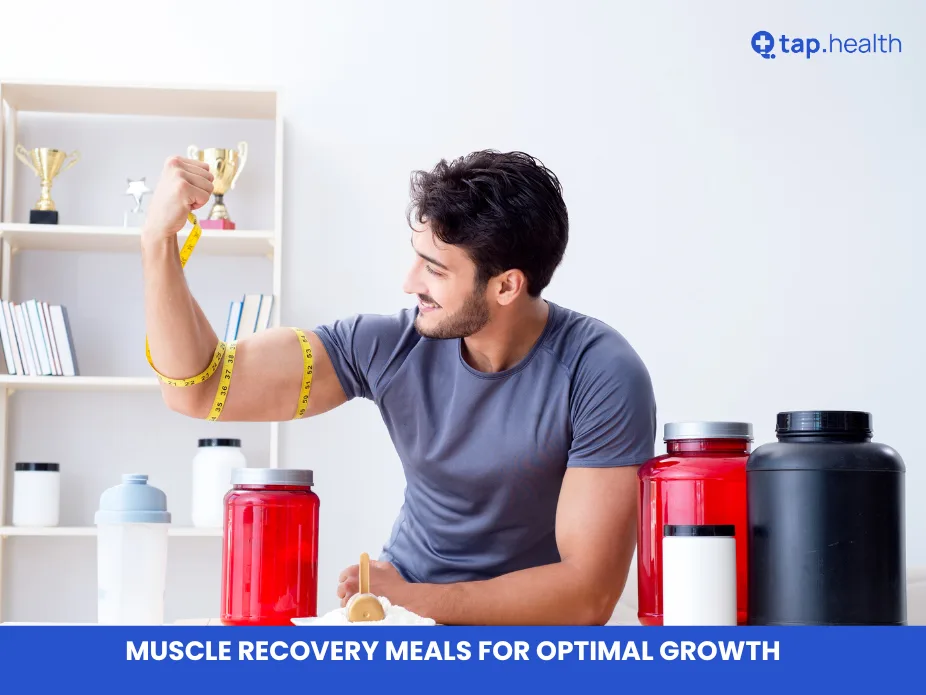Whether you’re a seasoned athlete or just starting your fitness journey, muscle recovery is crucial for building strength and achieving your goals. While workouts stimulate muscle growth, what you eat plays a significant role in repairing and building those muscles. Incorporating muscle recovery meals for optimal growth into your diet can help you recover faster, reduce soreness, and enhance muscle development. In this blog, we’ll explore delicious and nutritious meals that support muscle recovery, share real-life scenarios, expert insights, and provide easy-to-follow recommendations backed by research. Let’s dive in!
Why Your Diet Matters for Muscle Recovery
After a tough workout, your muscles need the right nutrients to repair and grow. A balanced diet rich in protein, carbohydrates, healthy fats, vitamins, and minerals can accelerate recovery, reduce muscle soreness, and promote muscle growth. Without proper nutrition, your body may struggle to repair muscle fibers, leading to prolonged soreness and decreased performance.
Key Nutrients for Muscle Recovery
- Protein: The building block of muscles. It helps repair and build muscle tissues.
- Carbohydrates: Replenish glycogen stores depleted during exercise and provide energy for recovery.
- Healthy Fats: Support hormone production and reduce inflammation.
- Vitamins and Minerals: Essential for various bodily functions, including muscle contraction and energy production.
- Antioxidants: Help reduce oxidative stress and muscle soreness.
Top Foods to Include in Your Diet for Muscle Recovery
1. Chicken Breast
Chicken breast is a lean source of high-quality protein, essential for muscle repair and growth. It’s also rich in B vitamins, which help convert food into energy.
Real-Life Scenario:
Jake, a 25-year-old weightlifter, incorporated more chicken breast into his post-workout meals. He noticed faster muscle recovery and increased strength gains within a few months.
2. Quinoa
Quinoa is a complete protein, meaning it contains all nine essential amino acids necessary for muscle repair. It’s also high in carbohydrates and fiber, making it a great energy source.
3. Greek Yogurt
Greek yogurt is packed with protein and probiotics, which aid in digestion and nutrient absorption. It also contains calcium, which is important for muscle function.
4. Salmon
Salmon is rich in omega-3 fatty acids, which help reduce inflammation and muscle soreness. It’s also a great source of protein and vitamin D.
5. Eggs
Eggs are an excellent source of protein and contain all essential amino acids. They also provide healthy fats and vitamins B12 and D, which support muscle growth and recovery.
6. Sweet Potatoes
Sweet potatoes are high in complex carbohydrates and vitamins A and C. They help replenish glycogen stores and reduce muscle inflammation.
7. Spinach
Spinach is loaded with antioxidants, vitamins, and minerals that support muscle function and reduce oxidative stress. It’s also a good source of iron, which helps transport oxygen to muscles.
8. Almonds
Almonds are a great source of healthy fats, protein, and magnesium. They help reduce muscle cramps and support muscle relaxation and recovery.
9. Cottage Cheese
Cottage cheese is rich in casein protein, which is slowly digested and provides a steady release of amino acids for muscle repair throughout the night.
10. Berries
Berries like blueberries, strawberries, and raspberries are high in antioxidants, which help combat inflammation and oxidative stress caused by intense workouts.
Expert Contributions
Dr. Mark Thompson, a sports nutritionist at the Athlete’s Health Institute, emphasizes the importance of nutrition in muscle recovery. He states, “Proper nutrition is just as important as training when it comes to muscle recovery and growth. Consuming the right nutrients at the right times can significantly enhance recovery, reduce muscle soreness, and promote optimal muscle growth” Athlete’s Health Institute.
Recommendations Grounded in Proven Research and Facts
Incorporate a Balance of Protein and Carbohydrates
After a workout, aim to consume a meal that includes both protein and carbohydrates. Protein helps repair and build muscle tissues, while carbohydrates replenish glycogen stores, providing energy for recovery.
Stay Hydrated
Proper hydration is essential for muscle function and recovery. Aim to drink at least eight glasses of water a day, and consider adding electrolytes if you engage in intense workouts.
Include Healthy Fats in Your Diet
Healthy fats found in foods like salmon, almonds, and avocado support hormone production and reduce inflammation, aiding in muscle recovery.
Consume Antioxidant-Rich Foods
Antioxidants help reduce oxidative stress and muscle soreness. Include plenty of fruits and vegetables like berries, spinach, and sweet potatoes in your diet.
Time Your Meals Appropriately
Eating a protein-rich meal or snack within two hours after your workout can optimize muscle recovery and growth. This window is when your muscles are most receptive to nutrients.
Real-Life Scenarios
Case Study 1: Sarah’s Recovery Boost
Sarah, a 30-year-old marathon runner, struggled with prolonged muscle soreness after long runs. After consulting with a nutritionist, she started incorporating more salmon, quinoa, and berries into her post-run meals. Within a few weeks, Sarah experienced reduced muscle soreness and improved recovery times, allowing her to train more effectively.
Case Study 2: Mike’s Muscle Growth
Mike, a 22-year-old college student and bodybuilder, wanted to maximize his muscle growth. He began focusing on muscle recovery meals by adding Greek yogurt, eggs, and sweet potatoes to his diet. Over six months, Mike saw significant increases in muscle mass and strength, along with faster recovery from his workouts.
Factual and Reliable Information
Research consistently supports the role of proper nutrition in muscle recovery and growth. A study published in the Journal of the International Society of Sports Nutrition found that protein intake after exercise enhances muscle protein synthesis, leading to greater muscle growth and recovery Journal of the International Society of Sports Nutrition.
Another study in Nutrients highlighted the benefits of omega-3 fatty acids in reducing muscle soreness and improving muscle function post-exercise Nutrients Journal.
Easy and Delicious Muscle Recovery Meal Ideas
Breakfast: Protein-Packed Omelette
Ingredients:
- 3 eggs
- 1/2 cup spinach, chopped
- 1/4 cup diced bell peppers
- 1/4 cup shredded cheese
- 1 tablespoon olive oil
- Salt and pepper to taste
Instructions:
- Heat olive oil in a skillet over medium heat.
- Add diced bell peppers and sauté until tender.
- Add spinach and cook until wilted.
- Beat the eggs in a bowl, then pour them into the skillet.
- Sprinkle shredded cheese on top.
- Cook until the eggs are set, then fold the omelette in half.
- Season with salt and pepper and serve warm for a protein-packed start to your day!
Lunch: Grilled Chicken and Quinoa Salad
Ingredients:
- 1 grilled chicken breast, sliced
- 1 cup cooked quinoa
- 1/2 cup cherry tomatoes, halved
- 1/2 avocado, diced
- 1/4 cup almonds, chopped
- 2 cups mixed greens
- 2 tablespoons olive oil
- 1 tablespoon lemon juice
- Salt and pepper to taste
Instructions:
- In a large bowl, combine cooked quinoa, mixed greens, cherry tomatoes, and avocado.
- Top with grilled chicken and chopped almonds.
- Drizzle with olive oil and lemon juice.
- Season with salt and pepper.
- Toss gently and serve for a nutritious and muscle-recovery-friendly lunch!
Dinner: Baked Salmon with Sweet Potatoes and Broccoli
Ingredients:
- 2 salmon fillets
- 2 medium sweet potatoes, peeled and diced
- 2 cups broccoli florets
- 2 tablespoons olive oil
- 1 lemon, sliced
- 2 cloves garlic, minced
- Salt and pepper to taste
Instructions:
- Preheat oven to 400°F (200°C).
- Place salmon fillets on a baking sheet. Drizzle with olive oil, and sprinkle with minced garlic, salt, and pepper. Top with lemon slices.
- In a separate baking dish, toss diced sweet potatoes and broccoli florets with olive oil, salt, and pepper.
- Bake salmon and vegetables for 20-25 minutes, or until salmon is cooked through and vegetables are tender.
- Serve together for a balanced and muscle-recovery-friendly dinner.
Snack: Greek Yogurt with Berries and Nuts
Ingredients:
- 1 cup Greek yogurt
- 1/2 cup mixed berries (strawberries, blueberries, raspberries)
- 2 tablespoons almonds or walnuts
- 1 tablespoon honey
- 1 tablespoon chia seeds
Instructions:
- In a bowl, add Greek yogurt.
- Top with mixed berries and nuts.
- Drizzle with honey.
- Sprinkle chia seeds on top.
- Enjoy a protein-packed and antioxidant-rich snack to aid in muscle recovery!
Smoothie: Berry Protein Recovery Smoothie
Ingredients:
- 1 cup almond milk
- 1 scoop protein powder (whey or plant-based)
- 1/2 cup mixed berries (blueberries, strawberries)
- 1 banana
- 1 tablespoon peanut butter
- 1 tablespoon flaxseeds
- Ice cubes (optional)
Instructions:
- Combine all ingredients in a blender.
- Blend until smooth.
- Pour into a glass and enjoy a refreshing, muscle-recovery-boosting smoothie!
Frequently Asked Questions (FAQ) on Muscle Recovery Meals for Optimal Growth
1. What are the best foods for muscle recovery?
Answer:
Foods rich in protein, carbohydrates, healthy fats, vitamins, and minerals are excellent for muscle recovery. Examples include chicken breast, quinoa, Greek yogurt, salmon, eggs, sweet potatoes, spinach, almonds, cottage cheese, and berries.
2. Can diet alone ensure optimal muscle growth?
Answer:
While a proper diet is crucial for muscle growth and recovery, combining it with regular strength training, adequate rest, and proper hydration is essential for optimal results.
3. How much protein do I need for muscle recovery?
Answer:
The recommended daily protein intake varies based on factors like age, gender, and activity level. Generally, athletes and those engaging in intense training should aim for 1.2 to 2.0 grams of protein per kilogram of body weight per day.
4. Are there any supplements that can aid muscle recovery?
Answer:
Yes, supplements like whey protein, BCAAs (branched-chain amino acids), and omega-3 fatty acids can support muscle recovery. However, it’s best to get most of your nutrients from whole foods and consult with a healthcare provider before starting any supplements.
5. How long does it take to recover muscles after a workout?
Answer:
Muscle recovery time can vary depending on the intensity and type of workout, as well as individual factors like nutrition and rest. Generally, it takes about 24 to 72 hours for muscles to recover from a strenuous workout.
Conclusion
Achieving optimal muscle growth doesn’t have to be complicated. By incorporating muscle recovery meals for optimal growth into your daily diet, you can provide your body with the essential nutrients it needs to repair and build muscle effectively. Focus on a balanced diet rich in protein, carbohydrates, healthy fats, vitamins, and minerals, stay hydrated, and ensure you’re getting enough rest. Remember, strong muscles start with what you eat!




